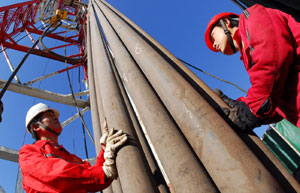China's price control policy benefits consumers, growers
Updated: 2010-11-19 10:19
(Xinhua)
BEIJING - While the United States is still grappling with its economic recovery by pumping 600 billion dollars into the market, China announced new measures to tame price gains, which were mainly caused by excessive liquidity.
China's State Council, or the Cabinet, pledged Wednesday that the government would make more efforts to stabilize commodity prices, ensure the supply of vegetables, grain, edible oil, sugar and cotton prices and crack down on speculation in agricultural goods.
The government may also impose temporary price controls on important daily necessities and production materials, when necessary, to counter the inflation that has accelerated to a 4.4 percent annual pace in October.
"The measures will benefit both the consumers and producers," Li Guoxiang, an analyst with the Rural Development Institute of the Chinese Academy of Social Sciences (CASS), told Xinhua News Agency Thursday.
"The government vowed to increase production of oil, especially diesel, to guarantee a sufficient supply, which will help cut delivery costs of agricultural products, leading farm produce prices to fall," Li said.
Also, diesel shortages hit China this winter as international oil prices jumped and domestic factories used extra fuel to power their generators. Some gas stations in East and South China ran dry and drivers struggled to get their trucks fueled in early November, pushing up delivery costs of agricultural products.
Also, data from the Ministry of Commerce showed the prices of 18 types of vegetables in China, including cabbage, potato and cucumbers, rose 62.4 percent year-on-year in early November, while prices of garlic and ginger jumped 95.9 percent and 89.5 percent, respectively, from one year earlier.
China's price control measures dragged farm produce prices down faster than expected. "Prices of Chinese cabbage fell to 0.5 yuan per kilo. Prices of other vegetables like celery and carrots dropped 30 percent compared with Wednesday," Wang Manyin, a 68-year-old citizen in Jinan, east China' s Shandong province, said while visiting a supermarket.
Wang and her husband together earned 1,400 yuan ($211) a month. "As a low-income earner, I really hope the measures could drag prices of agricultural products down a bit," she said.
The authorities said in Wednesday's statement it would offer temporary price subsidies for the needy and increase allowances for poor students as well as all students' living expenses. Social welfare benefits should be aligned with price levels and basic standards of social welfare should be gradually raised.
China's cotton prices surged to a record high this year, pushing up apparel prices. A statement posted on the website of the State-owned Assets Supervision and Administration Commission said the country's cotton output may fall 5.5 percent to 6.4 million metric tons this year.
Faced with possible shrinking output and growing demand, the government said Wednesday that it will increase cotton transportation from Xinjiang Uygur autonomous region, which is China's largest cotton-producing area. Its cotton acreage increased to 22 million mu (1.5 million hectares) this year.
Additionally, Xinjiang put extra trains into service to increase transportation of cotton, Liang Juan, an official of the Urumqi Railway Bureau said.
The total transport volume of cotton hits 13,500 tons per day. About 300 train wagons are available to carry cotton out of Xinjiang, Liang said.
Xinjiang also rolled out measures to crack down on cotton-price speculators.
What's more, the State Bureau of Material Reserve has sold cotton from state inventories this year in an effort to ease shortages and curb price gains. The reserves regulator plans more action this year, if needed.
Experts dismissed worries that the price control policy, which aims to stabilize prices may, instead, squeeze producers’ profit margins.
"The measures are targeted at wholesalers and dealers of agricultural products who bid up prices, rather than grain farmers," Li Guoxiang at the CASS said.
Han Changxue, a vegetable grower in Shouguang city, Shandong province, told Xinhua the purchase price of his cucumbers was around 1.2 to 1.3 yuan per kilo, barely enough to match his production costs.
However, cucumbers sold at 5.2 yuan per kilo at the supermarket, more than quadrupling Han's selling price.
"Growers like us didn't benefit from price gains. It is vegetable dealers who profited greatly," Han said.
"Many growers are consumers themselves. A stabilizing price level is in their interests,” Li said.
Zhuang Jian, a senior economist of the Asian Development Bank, pointed out that the root of recent rapid price gains was excessive liquidity caused by record lending last year.
Chinese banks extended a record 9.6 trillion yuan in new loans in 2009 to stimulate the economy amid the global financial crisis.
"The US quantitative easing policy will send more capital inflows into China, adding to domestic liquidity and undermining the country's fight against inflation," Zhuang added.
Actually, the government has moved to drain liquidity. The People's Bank of China, the central bank, raised its benchmark one-year lending rate on Oct 19 by a quarter of a percentage point to 5.56 percent, the first increase in more than two years.
Also, the central bank lifted the reserve requirement ratio for China's commercial lenders by 50 basis points on Nov 11 to mop up liquidity.
"China may need to continue to soak up liquidity in a bid to keep prices under control," Zhuang said.
Paper's Digest

China bags Asiad team tennis title after 24 yrs
Wimbledon semifinalist Li Na led host China to capture the team tennis title on Tuesday at the Asian Games, accomplishing her Asiad tour with three consecutive victories.
China rate rises no panacea to curb inflation: PBOC adviser
Specials

Russian possessed with TCM
Born into a family of doctors, Maxime became interested in Traditional Chinese Medicine (TCM) at the age of 12, after hearing about TCM theories such as health preservation and recuperation.

Acupuncture takes stab at UNESCO list
Acupuncture and Peking Opera have been selected as candidates for UNESCO intangible cultural heritage status.

The wedding coach comes back to life
A groom carries his bride from a wedding coach in Xuchang, Henan province, Nov 11, 2010. Produced a local factory, various original hand-made wedding carriages were displayed on the streets, attracting young people chasing fashion and an environment-friendly lifestyle.
 Shale gas lures oil majors
Shale gas lures oil majors



